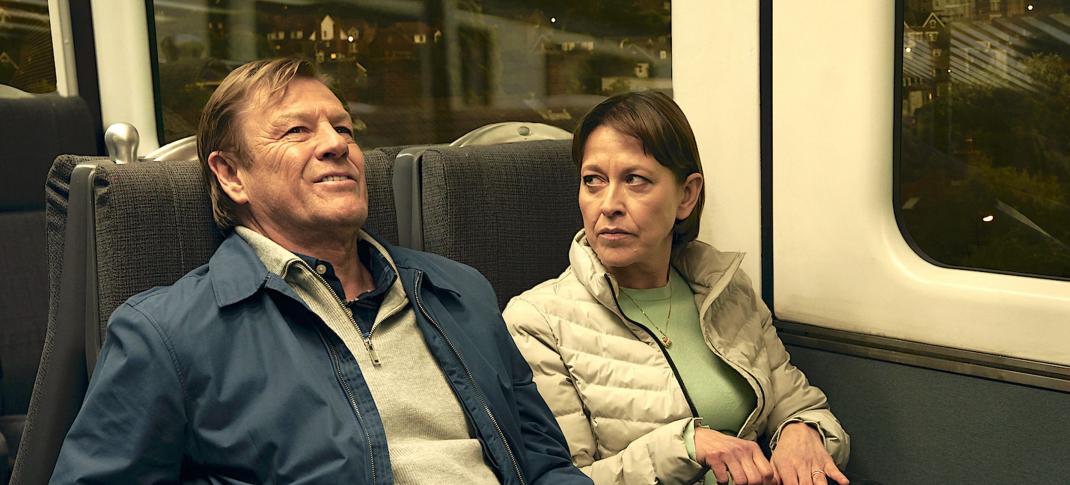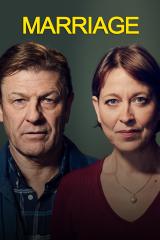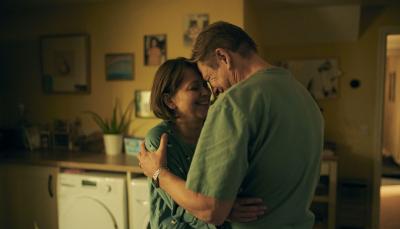'Marriage' Comes to PBS Passport, But Doesn’t Commit to the Drama

Sean Bean as Ian and Nicola Walker as Emma in Marriage.
Rory Mulvey/BBC/The Forge
Marriage is what brings us together today. But this series, streaming now on PBS Passport, is not a blessed arrangement. The show feels long for only four one-hour episodes, aiming for a slow-burn slice-of-life portrait of long-term married couple Ian (Sean Bean) and Emma (Nicola Walker). However, it drowns the audience in tedium and long silences. I kept waiting for breakthroughs or character revelations, which never materialized. The series advertises itself as a treatise on what it takes to keep a marriage going but winds up coming off as self-important, like it thinks it’s offering profound truths about relationships and human nature.
This is what marriage is, the show declares; the everyday banalities of doing dishes, watching TV, and having repetitive, shallow conversations with your spouse. And while that may be true for some, watching this couple’s bleak daily reality is not poignant. Editing would have improved the viewing experience by leaps and bounds. So many scenes play out with the audience watching Ian and Emma doing mundane tasks in real-time, in prolonged drawn-out silences. This is to showcase their boredom, disconnection, and loneliness. But the duration of these scenes gets excruciating.
The conversations that do happen are no less grueling: characters talk about unimportant, everyday things to avoid discussing big things. The moments that find characters speaking directly are refreshing, if only because they puncture the dreary subtlety of the rest of the series. Marriage is hard to watch because it often skews tedious and frustrating, not to mention depressing.
Ian and Emma have capital “T” trauma in their past, so avoiding real talk is at least understandable. Their first child died as a newborn, and they have never healed. They have a deeply forged bond of grief but never discuss their feelings. They shed tears separately at their son’s grave and don’t comfort each other. However, I’ll acknowledge that simply expressing their grief while the other sits with them is also essential.
Despite their problems, Ian and Emma have a deep affection for each other. They hold hands constantly and frequently kiss in public. This gives a nice contrast to their otherwise stodgy interactions. Besides the central pairing, the show attempts to explore the strained relationships between Emma and her father Gerry (James Bolam); Emma’s odd and unbalanced relationship with her boss Jamie (Henry Lloyd-Hughes); Ian’s blundering interactions with just about everyone; and the couple’s adopted daughter Jessica’s (Chantelle Alle) entanglement with her controlling new boyfriend Adam (Jack Holden).
Ian and Emma’s relationship is used as a contrast for Jessica and Adam’s dysfunctional and trending-towards-abusive couplehood. We’re meant to side with the adults here, but their romantic example is not exactly one to emulate. Although they are comfortable with and supportive of each other, there is seemingly no sexual intimacy, few shared interests, secretive behaviors, and a lack of emotional depth. Ian does show some vulnerability when he breaks down in tears several times. But even though Emma is right there to comfort him, she doesn’t know how to handle it and seems to believe he can bulldoze his way through these complex feelings.
The show being about these relationships, rather than being driven by the plot, is a weak point because conversation is how character development is attempted. That’s a mistake when so many discussions are painful to withstand, filled with awkward silences and repeated questions. Sometimes conversely, the show will edit out entire portions of conversations, going unexpectedly from buildup to aftermath without the meaty center. It made me distrust the filmmaker’s ability to create tension.
There’s also this penchant for characters to begin speaking as if someone’s already asked them a question. These interjections are evidence of all the inner monologues we’re not hearing. Perhaps the series is trying to lean into the cultural significance of this very English reticence, but it doesn’t read. Instead, there are moments when you might want to scream, “Just say something!”
(Side note: there is practically no music used in this series besides the strange, loud, tension-building a cappella theme song, which is insanely catchy and, for many, annoying. This song caused major complaints from UK viewers and critics alike. I challenge you not to come away chanting, “To the side. To the side! To the side and around.”)
Ultimately, the series feels like a criminal misuse of Sean Bean and Nicola Walker, two PBS fan favorites. They both lend credibility and believability to their roles that the script does not live up to. Bean is playing against type as an average schlub, managing to be both a sad sack and sympathetic — if occasionally creepy. Walker’s Emma seems to have a simmering rage, but this is never explored enough. Chantelle Alle, as Jessica, has presence and great energy and made me want to watch her in something else.
All four episodes of Marriage are streaming on PBS Passport.





